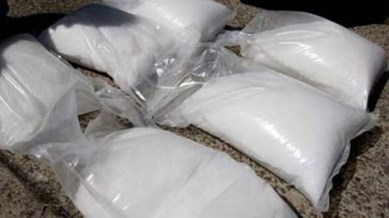Stay updated with the latest - Click here to follow us on Instagram
Heroin out, ‘nasheeli goliyan’ in: 25% of NDPS FIRs in Punjab linked to pharmaceutical drugs
“These days, a capsule called ‘Signature’ is being abused in the Malwa region. I have instructed Deputy Commissioners to use Section 144 to ban its sale in pharmacies,” says Yadav.

The rampant abuse of pharmaceutical drugs, known locally as nasheeli goliyaan (intoxicating tablets), has opened a new front in Punjab’s fight against narcotics addiction. Easily accessible and budget-friendly, these have become the drug of choice for many grappling with addiction.
This is illustrated by the fact that almost 25%, or 2,746 out of the 11,165 FIRs filed by Punjab Police under the Narcotic Drugs and Psychotropic Substances Act (NDPS) between April 1, 2022 and February 28, 2023, are related to the confiscation of such pills from individuals.
monthly limit of free stories.
with an Express account.
Director General of Police Gaurav Yadav says the uptick in abuse of pharma drugs is seen particularly in areas away from the International Border, where heroin is more prevalent. This could explain the high number of pill-related FIRs in Kapurthala (326), Sri Muktsar Sahib (174), Ludhiana (170), Mansa (157), and Bathinda (151) – all located far from the border with Pakistan, but close to pharmaceutical hubs like Baddi and Paonta Sahib in Himachal Pradesh, and Saharanpur in Uttar Pradesh.
“These days, a capsule called ‘Signature’ is being abused in the Malwa region. I have instructed Deputy Commissioners to use Section 144 to ban its sale in pharmacies,” says Yadav.
Some police officials say the rise in abuse of pills is a sign that supply of heroin is getting constricted.
In December 2018, the Punjab government suspended the licences of nearly 1,000 chemist shops following the recovery of habit-forming drugs worth Rs 5 crore in 291 units. Abhinav Trikha, commissioner of Food and Drug Administration (Punjab), said he suspended more than 713 licences and cancelled two between January 1 and September 30 this year, for various violations. The FDA also moved 70 complaints against chemists in the court this year, he said.
The number of chemist shops in Punjab has increased from 24,000 to 29,000 in the last five years, with 20,800 retail and 9,750 wholesale operational pharmacies.
A district police chief who spoke to The Indian Express on condition of anonymity said this addiction thrives because the supply of pharma drugs transcends state borders.
In July this year, the Fatehgarh Sahib Police dismantled an inter-state pharmaceutical drug cartel, seizing over 7 lakh tablets, capsules, and injections of pharma opioids from an illegal godown in Saharanpur district of Uttar Pradesh. In December 2022, the Punjab police confiscated over 7.5 lakh tablets smuggled into the state with the connivance of three pharmaceutical companies, two in Gujarat and one in Uttarakhand.
A scrutiny of the FIRs shows how a number of significant pain-relievers and anti-depressants, such as Tramadol, Alzepam, Buprenorphine, and even anti-diarrhoea medicines such as Lomotil are being abused.
The recent focus is on ‘Signature’ capsules, also called ‘ghode wale’ capsules, which are in demand in the Malwa belt. Ashok Balianwali, the head of the chemist association in Bathinda, explains that the tablet is actually Pregabalin 300 mg, originally used for diabetic neuropathy and related pain.
Several district administrations have now restricted the sale of these tablets to 30 gm potency with a prescription. However, people source them from neighbouring states like Rajasthan, where Pregabalin and Tramadol are easily available.
Amritsar-based Surinder Duggal, president of the regional chemists’ association and vice-president of the National Association of Chemists and Druggists of India, said of Tramadol, “It was initially considered one of the most effective pain relievers for cancer patients, known for its minimal side-effects. However, over time, it found its way into the hands of construction workers and labourers seeking relief from their everyday aches and pains. As its popularity grew, so did its abuse.”
In April 2018, the central government classified Tramadol as a psychotropic substance and brought it under the NDPS Act. Despite these restrictions, it continues to be seized in raids.
Two years ago, the Punjab government mandated that all proprietors of chemist shops hold a pharmaceutical degree, but many old licence holders still operate without one. “In many cases, it’s an employee who has the pharmaceutical degree, not the proprietor,” Balianwala said.
The business is a profitable business. Duggal explains that a tablet that costs Rs 0.50 can be sold to addicts for as much as Rs 100 each. Officers have noted that most heroin addicts turn to tablets when they can’t obtain an adequate supply of the drug or lack the money to buy it.
Everytime one pill is banned, Duggal says, addicts find new alternatives. “These days, I hear they are misusing an antihistamine called Levocetirizine, which is prescribed for the common cold,” he said.
Balianwala said restrictions on the sale of Pregabalin have led to a surge in the sale of Gabapentin, an anticonvulsant.
A district police chief, who has done extensive work in tracing the backward and forward linkages of the pharmaceutical opioids smuggling, says there is no laxity in enforcement. What is needed, he says, is improved regulation and monitoring throughout the country, as the problem extends beyond regional borders.
Indeed, enforcement is stringent. A glance at the FIRs reveals numerous cases where the accused were caught with less than 100 or even fifty tablets, often loose pills without markings.